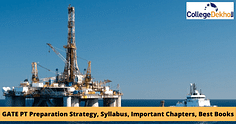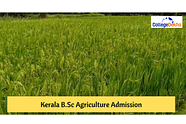
GATE Production & Industrial Engineering (PI) Syllabus 2024: IISc Bangalore has released the GATE Production and Industrial Engineering syllabus 2024 PDF on its official website- gate2024.iisc.ac.in. GATE PI syllabus 2024 includes 7 sections namely- Engineering Mathematics, Manufacturing Processes I, Manufacturing Processes II, General Engineering, Quality and Reliability, Industrial Engineering, and Operations Research and Operations Management. In addition, all the GATE papers will also have a General Aptitude section which will carry a weightage of 15 marks. In the GATE 2024 exam , Engineering Mathematics will carry 13% weightage, General Aptitude 15% weightage, and PI 72% weightage. Candidates who take the GATE 2023 PI paper can also take the GATE ME, MT, or XE as their second paper. The GATE 2023 PI paper will include 65 multiple-choice, multiple-select, and numerical response questions.
The GATE exam 2024 will be conducted on February 3, 4 and 10, 11, 2024. The GATE PI paper will be held on February 10, 2024. Candidates who will be sitting for the exam must attempt the GATE mock tests 2024 and GATE previous year question papers to improve their time management skills, work on their shortcomings, and analyze their preparation.
Read the full post to check the detailed GATE Production & Industrial Engineering syllabus 2024.GATE Production and Industrial Engineering Syllabus 2024
Candidates must study the complete GATE 2024 syllabus to ace the exam. To study and grasp the complete GATE PI syllabus 2024 candidate must prepare a proper study plan that includes all topics, days for revision, solving mock tests, previous year papers, and enough intervals. Check the detailed GATE 2024 Production and Industrial Engineering syllabus given below.
GATE Production & Industrial Engineering Syllabus 2024 Section 1: Engineering Mathematics
Topics | Sub Topics |
|---|---|
Linear Algebra | Matrix algebra, Eigenvalues and Eigenvectors, Systems of linear equations, |
Complex Variables | Analytic functions include concepts such as functions that can be represented by power series, Cauchy’s integral theorem, and the use of Taylor series for function approximation and expansion |
Differential Equations | First-order equations (linear and nonlinear), Higher order linear differential equations, Laplace transforms, Initial and boundary value problems |
Calculus | Single-variable functions, Limits, continuity, differentiability, Mean value theorems, Definite and improper integrals |
Probability and Statistics | Probability definitions, Sampling theorems, Conditional probability, Mean, median, mode, standard deviation, Random variables, Linear regression, Probability distributions (Poisson, normal, binomial, exponential) |
Numerical Methods | Numerical solutions of algebraic equations (linear and nonlinear), Numerical integration, and numerical methods for differential equations |
GATE Production and Industrial Engineering Syllabus 2024 Section 2: General Engineering
Topics | Sub Topics |
|---|---|
Engineering Materials | Structure, properties, and applications of engineering materials (metals, alloys, semiconductors, ceramics, polymers, and composites); Influence of heat treatment on mechanical properties; Iron-carbon equilibrium phase diagram; Behavior of metals and alloys under stress and strain |
Theory of Machines and Design | Analysis of mechanisms: Planar motion, cam systems; Mechanical systems: Governors, flywheels; Joining techniques: Bolts, rivets, welds, interference fits; Friction and lubrication principles; Component design: Shafts, keys, couplings, gears, belts, brakes, clutches; Pressure vessel design |
Applied Mechanics | Engineering mechanics: Force systems, equilibrium equations; Structural analysis: Trusses; Strength of materials: Stress, strain, failure theories; Structural deformation analysis: Beam deflection, column stability, cylinder behavior; Torsion mechanics |
Thermal and Fluid Engineering | Fluid mechanics: Statics, flow dynamics, Bernoulli’s equation, pipe flow, laminar and turbulent behavior, continuity equation, capillary phenomena; Dimensional analysis; Thermodynamics: Laws, systems, processes, work and heat calculations, air standard cycles; Heat transfer: Conduction, convection, and radiation principles |
GATE Production and Industrial Engineering Syllabus 2024 Section 3: Manufacturing Processes I
Topics | Sub Topics |
|---|---|
Joining of Materials | Classification of joining processes; Fusion welding processes: flame, arc, resistance, laser, electron beam;Solid-state welding processes: friction welding, friction stir welding, ultrasonic welding, Arc welding processes: SMAW, GMAW, GTAW, plasma arc; |
Metal Forming | Stress-strain relations, yield criteria, flow stress; Hot, warm, and cold working; Bulk-forming processes: forging, rolling, extrusion, wire drawing; Sheet metal working processes: blanking, punching, bending, and forming; Defects in metalworking and their causes |
Casting | Types of casting processes and applications; Sand casting: patterns, molds, cores, gating system, riser; Solidification analysis, microstructure development; Other casting techniques; Casting techniques for cast iron, steels, and non-ferrous metals |
Powder Processing | Production of metal/ceramic powders; Compaction and sintering of metal and ceramic powders; Cold and hot isostatic pressing |
Polymers and Composites | Polymer processing: injection, compression, blow molding, extrusion, calendaring, and thermoforming; Molding of composites |
GATE Production and Industrial Engineering Syllabus 2024 Section 4: Manufacturing Processes II
Topics | Sub Topics |
|---|---|
Machine Tools | Lathe, milling, drilling, and shaping machines: construction, kinematics; Jigs and fixtures: principles, applications, and design |
Machining | Orthogonal and oblique machining (USM: Ultrasonic Machining), Single point cutting tool, chip formation, cutting forces, Machining parameters, material removal rate; Machining processes: turning, milling, drilling, and grinding |
Computer Integrated Manufacturing | CAD (Computer-Aided Design), CAM (Computer-Aided Manufacturing), geometric modeling, CNC (Computer Numerical Control), Automation in manufacturing, (industrial robot,- configurations, drives, and controls), Cellular manufacturing, FMS (Flexible Manufacturing Systems), and CAPP (Computer-Aided Process Planning) |
Advanced Manufacturing | Principles and uses of USM (Ultrasonic Machining), AJM (Abrasive Jet Machining), WJM (Water Jet Machining), EDM (Electrical Discharge Machining), Wire EDM (Wire Electrical Discharge Machining), LBM (Laser Beam Machining), EBM (Electron Beam Machining), PAM (Plasma Arc Machining), CHM (Chemical Machining Additive manufacturing techniques |
GATE Production & Industrial Engineering Syllabus 2024 Section 5: Quality and Reliability
Metrology and Inspection: Accuracy and precision; Types of errors; Limits, fits and tolerances; Gauge design, Interchangeability, Selective assembly; Linear, angular, and form measurements (straightness, flatness, roundness, runout, and cylindricity) by mechanical and optical methods; Inspection of screw threads and gears; Surface roughness measurement by contact and non-contact methods.
Reliability and Maintenance: Reliability, availability and maintainability; Distribution of failure and repair times; Determination of MTBF and MTTR, Reliability models; Determination of system reliability; Preventive and predictive maintenance and replacement, Total productive maintenance.
Quality Management: Quality – concept and costs; Statistical quality control – process capability analysis, control charts for variables and attributes and acceptance sampling; Six sigma; Total quality management; Quality assurance and certification - ISO 9000, ISO14000.
GATE Production & Industrial Engineering Syllabus 2024 Section 6: Industrial Engineering
Product Design and Development: Principles of product design, tolerance design; Quality and cost considerations; Product life cycle; Standardization, simplification, diversification; Value engineering and analysis; Concurrent engineering; Design for “X”.
Work System Design: Taylor’s scientific management, Gilbreths’s contributions; Productivity – concepts and measurements; Method study, Micro-motion study, Principles of motion economy; Work measurement – time study, Work sampling, Standard data, PMTS; Ergonomics; Job evaluation and merit rating.
Facility Design:
Facility location factors and evaluation of alternate locations; Types of plant layout and their evaluation; Computer-aided layout design techniques; Assembly line balancing; Materials handling systems
Also Read:
GATE Production & Industrial Engineering Syllabus 2024 Section 7: Operations research and Operations management
Operation Research: Linear programming – problem formulation, simplex method, duality and sensitivity analysis; Transportation and assignment models; Integer programming; Constrained and unconstrained nonlinear optimization; Markovian queuing models; Simulation – manufacturing applications.
Production control: Forecasting techniques – causal and time series models, moving average, exponential smoothing, trend and seasonality; Aggregate production planning; Master production scheduling; MRP, MRP-II and ERP; Routing, scheduling and priority dispatching; Push and pull production systems, concepts of Lean and JIT manufacturing systems; Logistics, distribution, and supply chain management; Inventory – functions, costs, classifications, deterministic inventory models, quantity discount; Perpetual and periodic inventory control systems.
Engineering Economy and Costing: Elementary cost accounting and methods of depreciation; Break-even analysis; Techniques for evaluation of capital investments; Financial statements; Activity-based costing.
Project management: Scheduling techniques – Gantt chart, CPM, PERT and GERT.
Related Links:
GATE Production and Industrial Engineering Syllabus 2024 PDF Download
Candidates can access the GATE PI syllabus 2024 PDF by clicking on the link given below.
GATE 2024 Exam Pattern for Production and Industrial Engineering
Candidates must understand the GATE exam pattern 2024 to know about the marking scheme, exam duration, exam mode, section-wise weightage, etc. Go through the GATE 2024 exam pattern given below.
- The GATE 2024 exam will be conducted in online mode; Computer Based Test.
- The duration of the exam is 3 hours.
- Questions will be asked in MCQs, MSQs, & NATs format.
- There will be a total of 65 questions asked in the exam.
- GATE paper will be conducted for a total of 100 marks.
- There will be negative markings for MCQ-type questions only.
Also Read: GATE 2024 Highest Scoring & Important Topics
GATE 2024 Marks Distribution
Section | Distribution of Marks | Total Marks | Question Type |
|---|---|---|---|
Subject Paper (PI) + Engineering Mathematics |
| 85 marks | MCQs, MSQ and NATs |
General Aptitude |
| 15 marks | MCQs |
GATE 2024 Best Books for Production and Industrial Engineering
Candidates must be completely acquainted with the GATE Production and Industrial syllabus 2024 top books in order to obtain high marks and secure a seat at their selected institute. To prepare for the exam, it is important candidates get hold of the best study material. Selecting the best books for the GATE exam is important as the right choice of book will offer candidates an easy explanation of topics.
We have compiled some of the best books for GATE 2024 below that you can refer to.
Book Name | Author Name |
|---|---|
GATE Paper Production and Industrial Engineering - Solved Papers | G.K Publications |
Industrial Engineering and Production Management | Martand Telsang |
GATE Guide for Production and Industrial Engineering | GK Publications |
Production Technology: Manufacturing Processes, Technology and Automation | RK Jain |
CMOS Gate-Stack Scaling - Materials, Interfaces and Reliability Implications: Volume 1155 (English, Paperback, unknown) | Cambridge University Press |
In addition, you can also look at the following articles that will help you with your GATE 2024 exam preparation.
We hope that this post on GATE Production & Industrial Engineering (PI) Syllabus 2024 was helpful and informative.
















Similar Articles
GATE 2025 Exam Day Instructions - Documents to Carry, Guidelines
GATE 2025 Preparation Tips for General Aptitude
Last Minute Preparation Tips for GATE Civil Engineering 2025
GATE Mechanical Engineering (ME) Subject Wise Weightage & Best Books 2025
How to Score 80+ in GATE 2025 Electrical Engineering Exam?
GATE 2025 Petroleum Engineering Preparation Strategy, Syllabus, Important Chapters, Best Books